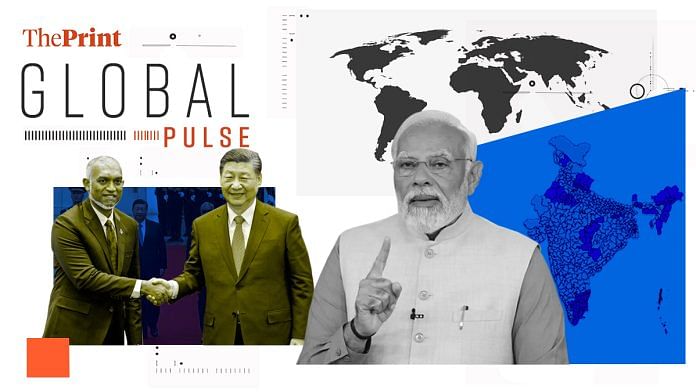New Delhi: In their article on Bloomberg, authors Sudhi Ranjan Sen and Shruti Srivastava write about why the Narendra Modi-led National Democratic Alliance’s goal of 400 seats in Lok Sabha could be a challenge.
The article, titled ‘Modi’s Path to 400-Seat Goal Runs Through South, East India’, says that while Modi has predicted that the coalition led by his Bharatiya Janata Party will win three out of every four seats parliament seats, this could prove to be a difficult, if not impossible, task. This, it says, is because of southern states, which have historically been resistant to his party’s Hindu nationalist message.
To win the south, the prime minister has intensified his efforts, leveraging his own appeal and reviving old disputes. But regional satraps and parties — including leaders like Mamata Banerjee in West Bengal — could complicate the BJP’s prospects, the article says.
“A decade in power leads to fatigue and anti-incumbency,” Pradeep Gupta, chairman of polling company Axis My India tells Bloomberg.
The New York Times, too, dedicated an article to the election. In his piece, ‘Why Did Modi Call India’s Muslims ‘Infiltrators’? Because He Could’, author Mujib Mashal says the “brazenness of Prime Minister Narendra Modi’s vilification” of India’s largest minority group — the Muslims — shows that he sees few checks at home or abroad on his power.
“He would not have made these comments unless he believed he could get away with it,” Daniel Markey, a senior adviser in the South Asia programme at the United States Institute of Peace, tells Mashal.
The author says that India under Modi’s rule has witnessed Hindu assertiveness and institutional discrimination against minorities. Meanwhile, global partners increasingly turn a blind eye “as they embrace the country as a democratic counterweight to China”, it says.
In its article, ‘For its next phase of growth, India needs a new reform agenda’, The Economist explores the economic trajectory of India under Modi, highlighting the consecration of the Ram temple in Ayodhya and its implications on the country’s business interests.
The report cites recent data by HDFC Bank to say that over the past five years, Uttar Pradesh has been growing at an annual rate of 5.3 percent — a percentage point faster than the national average — and at 9.2 percent since 2021. The state government’s investment as a percentage of output is the highest in India at 6.6 percent, the report says, adding that while PM Modi’s assertive leadership has driven progress, it has also raised concerns regarding his “authoritarian approach”.
In its article, the Sri Lanka Guardian asks ‘Can Narendra Modi Repeat His Election Victory This Time Too?’. According to it, Modi is expected to secure yet another term amid frequent criticism of the treatment of Muslims under his regime.
The article cites a recent survey pegging Modi’s public approval rating at 75 percent — a remarkably high figure for a head of government in office for nearly a decade. The popularity, however, is marked by several factors including “his personality, his leadership model, his achievements, his ideology, and India’s weak political opposition”, the article says, adding that while India’s assertiveness in foreign policy has helped cement its position globally amid China’s growing influence, the incidents such as alleged assassinations abroad strain relations with countries like Canada and the US.
In its latest article, ‘Maldives president’s pro-China party wins control of parliament in setback to India’, the Independent analysis the recent Maldivian elections, which saw the People’s National Congress led by the country’s pro-China president Mohamed Muizzu sweep to power. According to the author, Namita Singh, the election signals the Maldives’ shift away from India and towards China, bringing forward Muizzu’s pledge to pivot away from the country’s “India First” policy.
Also Read: It’s Modi’s pro-business stance vs Rahul’s unity message in foreign press on India’s elections
Possible ban on TikTok, escalating tension in universities — what’s happening in the US
The US Senate has approved a controversial landmark bill that could lead to a ban on TikTok in America. Read this BBC report to know more.
Top universities such as Columbia, New York University, and Yale are seeing protests and mounting tensions between pro-Palestinian and pro-Israel protesters over the ongoing conflict in Gaza. Read to know more.
Also Read: Make in India performance, 2047 target for economy — global press looks at what’s at stake for India



